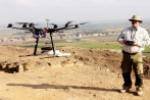When you hear the word ‘drones’ it tends to conjure up images of unmanned military aircraft hovering over a Middle Eastern scene, targeting suspected militants in a small village. Indeed they continue to be used for that purpose, amongst many others, by the military, but they are now entering the business world and surprisingly rapidly.
For example, last December Amazon has said that it intends to be using drones called Octocopters for the delivery of small parcels in five years’ time. Whether this will really ‘take off’ is another matter, but UPS have jumped on the band wagon too. Other civilian applications include aerial searches of disaster zones, farmers using them to survey acres of land at a time, improving internet access (Mark Zuckerburg’s intention),cheaper aerial reporting for news channels, aerial photography, and surveying wildlife.

A civilian drone that could be used for agriculture or delivery
The US Association for Unmanned Vehicle Systems International (the trade group representing drone producers and users) predicts that 80% of the commercial market for drones will eventually be for agriculture. Some say a basic device would cost only a couple of thousand pounds. Increased unmanned drone use will create some air traffic control issues (in March a drone nearly crashed into an American Airlines passenger plane while it was preparing to land at Tallahassee Regional Airport),but some people argue that this just presents an exciting new challenge and that more jobs will be created to deal with it.
Which begs the question, what effect will unmanned drones have on a company’s workforce? First of all it depends on the definition of ‘unmanned’. Many drones at present, both military and civilian, do have a pilot; he or she just sits in a trailer or an office flying the drone instead of in a cockpit. But we are getting closer to the use of autonomous drones that simply need to be told what to do (possibly by another computer) and will then (hopefully) do it. If air traffic control can cope with this, it may leave delivery people short of a job. The demand for skilled mechanics and IT people would probably go up quite substantially, as would the price of insurance for these organisations. Imagine the effects of a drone going wrong and falling out of the sky onto something or someone.
If these drones do become a big commercial reality, some organisations’ workforces may have to be restructured – but to what extent? Firstly we have to ask what sort of effect drone delivery would have. It will only be for small parcels for the foreseeable future, so the delivery of large items or large numbers of small items will probably still fall to the man or woman with a van. It may be that some new start-up companies decide to be ‘the drone deliverers’ and so the workforces of already-existing companies may be affected less. For farming there may be a few jobs lost, but probably not many. The drone may find the problem and perhaps be able to drop some fertiliser or crop spray onto an area, but it often takes human expertise to deal with such an issue long-term.
Technological changes where people are replaced by machinery are nothing new. It’s been happening for centuries, and if drones become a commercial reality it probably won’t be a rapid change. People should have a reasonable amount of time to adapt to the changing working environment. The unions won’t like anything of this type but I don’t predict bands of Victorian style Luddite machine breakers tearing round logistical sites destroying new means of delivery!
The main issue perhaps is privacy which despite legislation like the Data Protection Act 1998 is under continual threat. This is often for very good reasons such as the ability to ensure we have effective counter-terrorism activities. Most people take the issue of privacy quite seriously in Britain and elsewhere. Farmers probably wouldn’t cause much trouble, as most farmland tends not to be heavily populated. Delivery-wise though it could take a while before people get used to unmanned helicopters flying regularly overhead and questions will inevitably arise about whether additional data is being collected. There will need to be a sustained PR effort to reassure people that the ‘big corporations’ are not developing even more power.
Whatever your view of unmanned aerial vehicles, they are likely to play a greater part in modern life in the near future. The chances are though it will be an evolution rather than a revolution.
Russell HR Consulting provides expert knowledge in HR solutions, employment law training and HR tools and resources to businesses across the UK.
Subscribe to our free monthly HR newsletter. Russell HR Consulting employment law newsletters are emailed automatically to our ever-growing number of subscribers every month.
Latest blog posts
- Is There a Santa Clause?
06 / 12 / 2023
- Lend Us a Hand!
22 / 11 / 2023
- What Happens When There is a Clash in Protected Characteristics?
17 / 10 / 2023
- Encouraging a Healthy Workforce 2
21 / 09 / 2023
- Encouraging a Healthy Workforce
23 / 08 / 2023
- What a Disaster - (But We Have a Cunning Plan!)
20 / 07 / 2023
- It’s Time We Stiffened the Sinews
14 / 06 / 2023
- Why Is It So Important to Develop Emotional Resilience?
16 / 05 / 2023
- When is a discretionary bonus not discretionary?
20 / 04 / 2023
- Recovering Training Costs 15 / 03 / 2023
